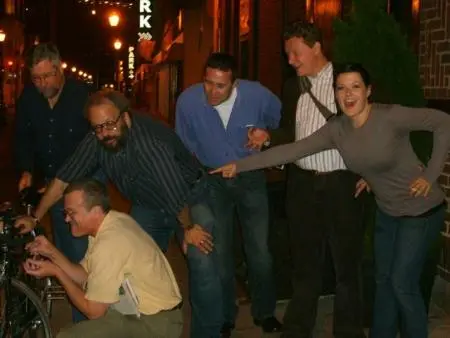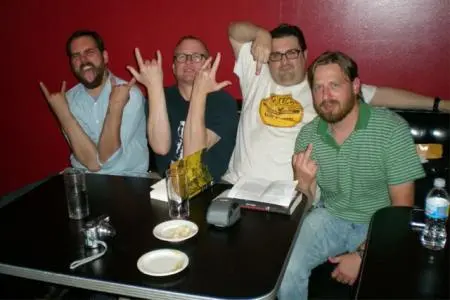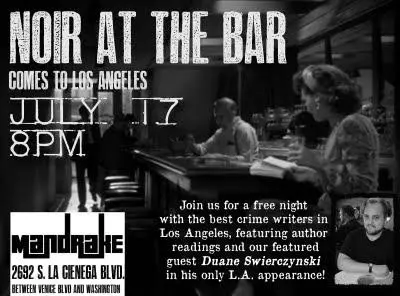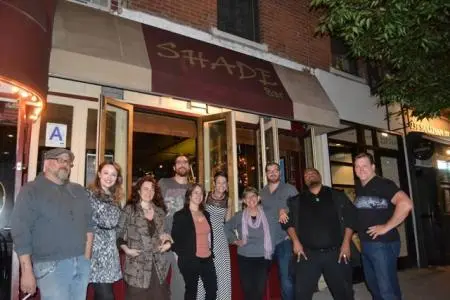Header image via Brent Schoonover
If you’re on Facebook or other social media outlets and you're following characters like LitReactor’s Rob Hart or Thuglit’s Todd Robinson, chances are you’ve seen invites and pictures of an event called Noir at the Bar. Even if you’re not connected to those two and you’re friends with someone like Benjamin Whitmer, Hilary Davidson, Owen Laukkanen, Megan Abbott, and J. David Osbourne, chances are you’ve heard of Noir at the Bar.
Over the last seven years, dozens of Noir at the Bar events have sprung up around the country, and it has become something of a phenomena in the crime fiction community. And because of its wild impact, I wanted to somehow document the events, and I wanted to hear the stories behind the four original events in Philadelphia, St. Louis, Los Angeles, and New York. I wanted to hear from the organizers—Peter Rozovsky, Jedidiah Ayres, Eric Beetner, Glenn Gray, and Todd Robinson—and readers themselves.
So, without further ado, here is Noir at the Bar: An Oral History.
Noir at the Bar: Philadelphia
Crime fiction critic and blogger Peter Rozovsky of Detectives Beyond Borders is the originator of Noir at the Bar.
What inspired you to organize the first Noir at the Bar?
Peter Rozovsky: I had recently attended my first crime fiction convention, Noircon 2008 in Philadelphia, and I was fired with enthusiasm for all things crime fiction. I was chatting with a literate friend who tended bar at a Philadelphia place whose décor happened to be all black. Noir at the Bar grew from those discussions.
What were the differences in format between the first Noir at the Bar and the readings that have sprung up nationwide?
Peter Rozovsky: The initial writers were mostly Philadelphia-area authors I had met at that first Noircon or authors I had met through them: Duane Swierczynski, followed by Jon McGoran, Dave White, Jonathan Maberry, Sandra Ruttan, Dennis Tafoya. The MCs/questioners for those events included Ed Pettit (the Philly Poe Guy), Sarah Weinman, Brian Lindenmuth, and me.
I initially invited one writer to read at each session, to be followed by questions from me or a questioner of the author’s choice, and then questions from the audience. Declan Burke and John McFetridge stopped in for a two-headed Noir at the Bar on the way to Bouchercon 2008 in Baltimore, but one writer was the rule.
The concept really took off when Scott Phillips and Jedidiah Ayres began doing Noirs at the Bar in St. Louus with large groups of writers, which brought bigger crowds out but meant eliminating the interviews and Q&A. About a year ago, I MC’d a Noir at the Bar in New Hope, Pa., that combined the two approaches: About five authors read, followed by questions from me. I hope to do more events along those lines.
Noir at the Bar: St. Louis
Why did you decide to start Noir at the Bar?
Jedidiah Ayres: When Scott Phillips came back from Noir Con 2008 he told me about this cool thing Peter Rozovsky organized called Noir at the Bar, where you gathered a bunch of crime fiction writers/readers/fans in a bar and got to the good/bad stuff. Then he put it out in the universe that it sure would be swell to have something like that in St. Louis. St. Louis gets a handful of dates on major book tours — we're blessed with a few local institutions and independent bookstores that work to get our town a slot on the whistle stops of the big gals 'n guys (folks like The St. Louis County Library and Left Bank Books) — but the writers we are particularly attracted to tend to have mucho talent and niche appeal, so yeah, hardly ever had the chance to catch 'em if they happened through on their own dime or only heard we'd missed 'em after the fact. We wanted to establish the venue, the platform and most importantly the community for the stuff we loved in order to not miss out when our people were coming through, and perhaps even become reason enough for St. Louis to be a target for the mid-list, cult and otherwise invisible authors we knew were out there.
How did you decide who to invite to read at your first Noir at the Bar?
Jedidiah Ayres: A few months later Anthony Neil Smith was coming through St. Louis on his way to Mississippi and looking to promote Hogdoggin' along the way. Talking with Scott, one of us suggested that now would be the time to try our hand at doing the event and the other failed to talk him out of it. Neil's attendance and a little online public badgering was enough to get this guy named Frank Bill, who lived relatively near by, to make the four hour drive to hang out with us for an evening. I'd been reading Frank's work online in places like Plots With Guns, Thuglit and Beat to a Pulp, and traded a few words with him electronically, and believed he'd make a great spiritual addition to our gathering.
Who was your favorite reader at the first event?
Jedidiah Ayres: Scott emceed that first evening (we trade off the privilege) and read first with a hilarious and raunchy chapter from his at the time forthcoming novel RUT, and I followed up with a passage from Fierce Bitches that had been published in Thuglit, and Frank stood up and delivered two blasts from the sawed-off not yet titled Crimes in Southern Indiana. Neil capped the evening with a bone-breaker of a roadkill passage from Hogdoggin' and we were all pleased enough with the end result that we kept on doing it. Everybody who read at that first event has come back once or twice to do it again.
(Quick editorial note: In typical Jedidiah Ayres fashion, Ayres selected himself as his favorite reader. I wonder how many of the organizers of the various Noir at the Bar’s would list themselves as their favorite readers if they were honest? But I digress …)
Here’s brief excerpt from Fierce Bitches:
“Maria is upset. Her chubby fingers, trembling, can’t cover her mouth sufficiently to smother the sobs. Wakes you up. Judging by the light coming through the gaps in the tin roof, it’s near nine. The atmosphere is like an amniotic sac.
“What is it, for fuck’s sake?”
Her reply is lost on you. She sounds like a Pentecostal Rosie Perez, frothing and speaking a hundred miles an hour. Four months here and you haven’t grasped the language. Haven’t even tried. You aren’t planning on sticking around.
“English. Speak English por favor.” Hysterical shrieks. “No, forget I said anything. I need a smoke.” You fish through your clothes beside the bed mat, till you see the cigarettes on her table. Clothed only in sweat, you stand and strike a match. She still sounds like a maniac, running in circles around the room. You grab her by the shoulders to slow her down, and speak very deliberately.
“What...is...your...problem?” She slaps you hard across the face and chest and you slap her back. She grabs your clothes, tosses them outside the hut and pushes you after them. Fine with you. You haven’t paid yet.
The dust clings to your damp parts. In this heat, that’s pretty much an entire outfit. You collect your clothes and carry them under your arm as you start toward the cantina.
You’ve been to Mexico once before, but this time had fuck all to do with Sammy Hagar and margaritas. This was all dust and rocks and heatstroke, skin turning to leather and sunshine so intense, your balls disappear when you squint. The Sierra Madres hemming you in sounds good for a movie, but actually makes you feel like a fish in a bowl.
You make your way barefoot toward the only road around, trying like hell to extract some nutrients from your cigarette. The dog carcass from the day before has been disappeared from the roadside and you make a mental note not to chance Ramon’s stew today.
A debris cloud still hangs in the air, which means an automobile instead of a mule cart has come by recently. That could indicate a couple of things: A. Extra shipment this week or B. Trouble in paradise.
A half-dozen tin shacks like Maria’s pock the desert in no particular pattern. Thrown up without a thought to symmetry or community. A crowd gathers outside the furthest, next to the cantina. The cloud settles behind a black Cadillac, which means the answer is in fact B.– Polito sent his muscle to settle something.
The crowd is comprised entirely of women, the whores who live here at the whim of Harlan Polito - who is decreeing judgment from on high back in the States. Also here by his will is a small group of gringos; roughnecks, punks and psychos who do dirty deeds for money and pleasure. You belong to this group. You stay here till the man sends for you to return to the bosom of society and contribute again.
No one seems to notice your nakedness as you approach, not even Metcalf, who comes out to meet you.
Noir at the Bar: St. Louis continues along unabated and hosted by Ayres and Phillips. To date the St. Louis events have featured such writers as Matthew McBride, Fred Venturi, Laura and Pinckney Benedict to name just a few.
Noir at the Bar: Los Angeles
Why did you decide to start Noir at the Bar?
Eric Beetner: I decided to start an L.A chapter of Noir at the Bar after the Mystery Bookstore closed. I realized a few months later that the hub for writers had vanished. I wasn't getting to see my friends and chat with writers who offered me so much advice and mentoring in my early days in publishing. I wanted that sense of community again. I knew of what Jed and Scott were doing in St. Louis (I still hadn't heard of the Philadelphia history) and I felt like co-opting the name would be better than trying to do a cheap knockoff or reinventing something that didn't need it. So I first went to Jed and Scott to ask permission. I wasn't sure if they would be territorial about it or not. They gave the thumbs up and educated me on the history and the fact that they had done exactly as I was trying to do by borrowing the idea from Peter Rozofsky.
Next, I contacted several local crime writers to ask if they thought there would be enough interest, both as readers and as attendees since I really wanted a place where writers could mingle and mix it up with each other as much as with readers. The primary goal for me was never about selling books. I wanted the social aspect and the central hub that was missing. And in a city like L.A. it seemed absurd that there wasn't a close knit crime writing community.
The response I got was overwhelmingly positive. Among the writers I contacted was Stephen Blackmoore, who said he was toying with a similar idea, so we partnered up. We had the same goal in mind and then later, Stephen was instrumental in getting our bookseller, Mysterious Galaxy, to come out and start selling books. Once we added that, it gave touring authors another place to stop and make a book tour a viable thing. Again, with the book stores closing, even a city as big as L.A. had very few options for places for crime writers to do a signing. What we've been able to provide is a genuine destination for touring authors. Now we try to book dates around authors on the road and we've lured writers from as far away as the east coast and Canada.
How did you decide who to invite to read at your first Noir at the Bar?
Eric Beetner: For the first one we knew both Stephen and I would read, because why not. Easy bookings. I knew Duane Swierczynski had a book coming out at the time so I went for it and asked him. He said yes so we had our headliner. I can't underestimate how big a fan I am of Duane's so having him read was a no brainier. It wasn't until much later that I learned he also read at the very first Noir Bar in Philly. So, full circle and all that. I really try to snag readers I love to come out and read for us. I've coaxed people like Megan Abbott, Sara Gran, and Charlie Huston to come out even if it has taken three or four times asking. What's nice is that now we have people coming to us looking for a slot. It's nice to be known as a great place to read in front of an enthusiastic crowd.
We try hard to have a mix of new and established authors at our events. Many new readers have never read their work in public before. We don't require anyone to have been published. At our first event we had Holly West on the bill and she'd only had short stories at a few places. Now she's had two novels published. It's great to see writers grow within our community and for them to share that evolution at Noir at the Bar.
Who was your favorite reader at your first Noir at the Bar?
Eric Beetner: At the first one, I'd say Duane Swierczynski was my favorite because I love his stuff. He read from a new piece he was working on, not the novel. It's great when people mix it up. We let them read whatever they want. Duane read from a thing called Breakneck that hasn't been heard of since, so we all got a taste of a very exclusive piece. Maybe it will resurface later on and we can all day we heard an early version.
Why did you decide to read Breakneck at the First L.A. Noir at the Bar?
Duane Swierczynski: I chose the first two pages of Breakneck for L.A. (and St. Louis N@B, come to think of it) because it was relatively short and fun to read out loud. For a while, it was going to be my follow-up to Severance Package, but I made it to page 100 before putting it aside. Just this past year, though, I adapted it as a creator-owned comic, and there should be an announcement soon-ish about where it’ll appear. (It’s a new publisher for me, but a familiar one to a lot of readers. And no I can’t tell you. Not even when you make with the puppy dog eyes.)
Here is an excerpt from Breakneck:
You’re standing outside Room 11 of the George Washington Hotel, black aluminum bat in one hand, muddy brick in the other.
The bat is coated in gray dust. For the past nine months, it’s been wedged under your bed, totally forgotten.
The brick is from the tiny courtyard behind your apartment building. You pried it loose about 40 minutes ago, on your way to the car. You felt silly at the time, but now you’re glad you brought it. Because now you’re thinking about tossing the brick through the window, forcing him to come out.
And then…
Well, that’s why you’ve got the bat.
* * *
But wait.
What if you break the window—and the guy goes to the window instead of the door?
Then you’d have to bolt. That, or go after the fucker through the broken window—which leaves you at a serious disadvantage. See, you’d have to use the bat to tap away the rest of the glass before you climb in, otherwise one good slip and it’s goodbye scrotal sac. And by the time you did that, he could be ready for you with something heavy in his hands. Or with something that fires bullets.
Worse yet: what if you throw the brick, and it’s the wrong room?
No. You got the right room. The text said “Room 11.” This is Room 11. The George Washington Hotel. Slogan: We cannot tell a lie—you’ll love staying with us.
It’s a cold February morning—dead quiet up here on the fringes of Northeast Philadelphia. The ground is coated with a white slush from a brief predawn snowfall. Fortunately for you, the building angles away from US-1. Directly in front of you, beyond the parking lot, is a state wildlife refuge, named after some long-dead senator—which just means they haven’t gotten around to developing it yet.
So nobody can see you standing outside, baseball bat in one hand, brick in the other.
* * *
Still, you can’t stand out here forever. Sooner or later a motel employee will notice you. Or worse, a passing cop or state trooper over on US-1.
So you’ve got to do something. You were up all night. You can’t just go home.
You mull your options.
Maybe you could just knock on the door, hide the bat and brick behind your back, hope the guy answers?
No. That won’t work, either. The door has a tiny brass peephole. And the guy is waiting for a familiar face. A pretty face. Not your face. No way he’d open the door to a stranger.
You keep thinking.
You saw this movie once where a skinny tattooed PI slid a credit card between the lock and frame, then knocked on the door. The moment he saw movement in the peephole, the PI kicked open the door, knocking the other guy on his ass.
But there was one problem—and it was something that bothered you when you first watched it. What if the guy had a chain on the door? You kick it in, it goes nowhere. You might even blow out your knee.
So many ways this could go wrong.
You can’t give up now, though. You’ve come all this way—from downtown Philly to the northeast. A 40 minute drive. What, are you just going to turn around and go home. You need to see him, so you can…
So you can what, exactly?
You know, maybe you should just go home. That would be the easiest thing. Just walk back across the parking lot to your Subaru Forester, take US-1 all the way back downtown, and pretend like this never happened.
Yeah.
That’s definitely what you should do.
You turn toward the Subaru and make it whole three steps before you…
Wait.
No.
Fuck no.
You can’t go home now. Because it will nag you all day, and you’ll end up staring at the ceiling all night long, just like you’ve done for the past two nights. Running questions around in your head. Scenarios. Endless scenarios.
You watch the traffic whiz by on US-1 for a few more seconds, trying to make up your mind.
Then the door to room 11 pops open.
Why do you continue to run Noir at the Bar?
Eric Beetner: We have talked about feeling a bit burned out sometimes, but I really do think it is an important part of the crime writing community in Los angels now. I would hate for it to go away. I wish we could lure even larger crowds, but we don't do much to promote it. We really should get better about that, but in a city with so much going on, local press ignores our requests. If you're not a huge movie premiere, you're small time. And the response we get from grateful authors who travel from far and wide, and enthusiastic readers who get a chance to meet authors who they are already fans of as well as finding new voices, that's what it's all about. At this point, four years into it, it would be weird to go to an event and not be organizing it. Someday I'm sure we may pass it off, but every time I think about it I just can't let it go yet.
It's nice to be somewhat known within crime writing circles, too, as someone who is working to build a community. When I have done the event at Bouchercon, so many authors know of us and appreciate what we're doing. Everyone knows the space for author appearances is shrinking. It's nice to work on being a part of the solution rather than just moaning about it.
So we're here for the duration. We will continue to go after big authors and invite in the small and watch them grow. Well keep working on ways to innovate. We've shown short films, done staged readings with actors, done theme nights. We'll try anything to keep it fresh. And we love mentoring other people to start their own like they've done in San Diego now.
Noir at the Bar: New York
Why did you decide to start Noir at the Bar?
Todd Robinson: Glenn Gray and Tommy Pluck bullied me.
Glenn Gray: After St. Louis and LA, we wanted to get a NYC N@B going. Represent the east coast, that kind of thing. Also figured it was a good way to meet new writers, give back, and just have some fun.
How did you decide who to invite to read at your first Noir at the Bar?
Todd Robinson: We just sort of opened it up. A couple people were in town for BEA, and we openly asked who else wanted in. When we hit thirteen people, we figured that it would be enough for an event. NOTE: Thirteen is too many.
Glenn Gray: We didn't know going in who we would invite, we just kind of crossed our fingers that we'd get some people. We put the word out, asked some local guys, and Shade regulars (Ricjie Narvaez, Justin Porter), and we heard Johnny Shaw was going to be in town, I think for NY Book Expo, so we figured to time it around that, hoping many writers would be in town.
Who was your favorite reader at your first Noir at the Bar?
Todd Robinson: Johnny Goddamn Shaw. The guy is a destroyer at these things...and I had to follow the sonofabitch. His story was about Chingon: The World's Most Dangerous Mexican. The story was all boobs and hand grenades. How the fuck do you follow that?
Glenn Gray: Johnny Shaw. Johnny made it clear that the best type of thing to read was something funny, crazy or over the top. And if you do it well, everyone has a good time. Johnny read a portion of the Chingon Story from Blood and Tacos and it was so ridiculous and funny it was great. Bonus points when you get the crowd laughing.
Johnny Shaw: When I read I have a couple go-to excerpts. I like to keep it short and funny, because when you’re going for laughs you have a better gauge of whether or not the audience is digging it. I rarely read over eight minutes. Six or seven is closer to the sweet spot. Leave them wanting more.
Also, if you haven’t noticed, I’ve got a monotone voice, so the material has to complement that. It has to be strong on its own and play against my somewhat dry delivery. Readings are performances, not presentations. It’s about entertainment.
The piece that both the LA and New York crew are probably referring to is my story “Blood and Tacos,” featuring the character Chingón, the short story that lead to the creation of the BLOOD & TACOS quarterly. It usually kills. It’s big satire and densely funny. I’m very proud of that story, as it has very little set-up and mostly just punchlines. That tied to its outrageousness makes for a crowd-pleaser.
Here’s a brief excerpt of Blood and Tacos:
Chingón was known by many names: The Matador of Mayhem. The Caballero of Catastrophe. The Hermano of Hurt. The Patrón of Pain. And the admittedly less-inspired, Jefe of Internal Injuries.
There was no doubt that he truly was The World’s Deadliest Mexican. The Mexecutioner.
Feared for his prowess with his bullwhip Marta and his deadly accuracy with grenades, like a snake charmer or a lion tamer, Chingón had learned to tame man’s most dangerous weapon into something he could massage and control. His reputation was spread by the few that had seen him in action. Very few. Most of the others had exploded. And the explosions had killed them.
Why do you continue to run Noir at the Bar? And if you don't, why did you stop organizing them? Who did you hand your Noir at the Bar over to and how are they doing in your opinion in organizing the events?
Todd Robinson: Glenn and I ran the show for two years, and have now handed the reins to Tommy Pluck. It just got tiring. At certain points, the readings got political. People get pissy when they're not invited each time, other writers act like you should be kissing their puckered asses just because they showed up. In other words, hell is other people. Tommy has been killing it every time since. I think he's more patient with people. I'm just a crabby bastid.
Glenn Gray: Todd and I stopped, but may return in the future. After 9 of them it just got to be too much. We at least needed a break. It is stressful getting that many people to commit to a certain date and people cancel and don't get back, that kind of thing. And when you're doing something that's a labor of love, once it loses the fun or becomes too much trouble, it's kind of hard to keep going. I think Todd and I were very generous, raffling off books, some that we bought ourselves (I think we were the first to do the giveaways). We just wanted to have fun and didn't have a formal bookseller there because we wanted to keep it about the reading and connection, and not come across that we were trying to hustle books. Although if an author brought some of their books they could certainly sell a few when people asked, which was done time to time, but that was their own thing. We turned it over to Tom Pluck and I think he's doing a wonderful job.He was kind of informally involved at the beginning and was a frequent reader and help. He did a few so far, rather quickly I must say, but time will tell if he keeps it up because it can turn into hassle rather quickly. Thing is, people start to ask and say hey when can I read? Or, so and so in coming into town on this date and wants you guys to have a N@B. Yes, that did happen a lot. We were always very accommodating when we could but you could see how then you have to start worrying about hurting peoples feelings if you didn't invite etc. You understand.
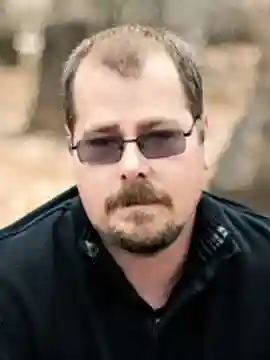
About the author
Keith Rawson is a little-known pulp writer whose short fiction, poetry, essays, reviews, and interviews have been widely published both online and in print. He is the author of the short story collection The Chaos We Know (SnubNose Press)and Co-Editor of the anthology Crime Factory: The First Shift. He lives in Southern Arizona with his wife and daughter.
